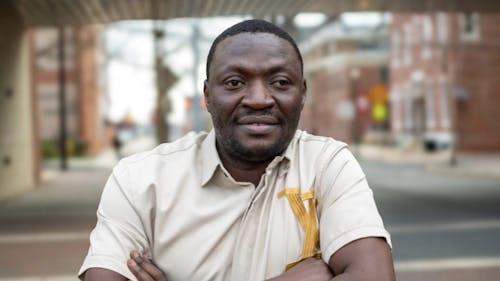U. professor awarded Chancellor's Grant for health technology research

Joseph Abbas, a Ph.D. student in the Prevention Science Program at Rutgers—Camden, recently received the Chancellor's Grant for Student Research for his study on the impact of social media health apps on student well-being, according to a press release.
The $8,000 grant is awarded every semester and seeks to recognize faculty-supervised student research initiatives at the Camden campus. The Daily Targum spoke with Abbas about his career background, research and funding from the University.
Prior to his time at Rutgers, Abbas worked for nongovernmental organizations (NGOs) in Nigeria, which inspired him to find ways to address health issues proactively.
During this experience, he said he recognized that efforts toward relieving social, health and economic ailments typically put minimal energy toward prevention methods.
"This exposure was pivotal, steering me toward a research path focused on prevention as a means to curb community suffering before its onset," Abbas said.
His research examines the relationship between health technology, such as health apps, and prevention education. Abbas said he intends to improve community health by employing digital solutions.
Abbas' present research, titled "Exploring the Ripple Effect: The Power of Social Media Health Apps on Rutgers—Camden Students' Wellness Journey," is under the guidance of Rutgers faculty Daniel Hart, a University professor in the Prevention Science Program, and Kristin August, an associate professor in the Departments of Psychology and Health Sciences and director of the Prevention Science Program.
With the support of the Chancellor's Research Grant, Abbas aims to determine how online platforms like Health E Livin affect student health at the Camden campus. He said he utilizes both digital and in-person strategies to gauge the app's effectiveness and use.
"The ultimate goal is to provide actionable insights that can inform the development of more effective, student-centered health initiatives and contribute to a healthier campus environment," Abbas said.
Preliminary findings from his ongoing research indicate that in-person activities were strongly positively correlated with app downloads, according to Abbas. He said a mix of online and in-person interaction contributes to a health-focused campus culture.
Abbas said he foresees practical and academic uses of the study's conclusions. He said his study's results can inform health apps’ on-campus marketing by showing that in-person campaigns increase downloads.
From an academic standpoint, theoretical frameworks such as the Technology Acceptance Model and the Health Belief Model, along with factual evidence, are integrated into research that informs University health initiatives and app developers, Abbas said.
"This research not only enriches academic discourse but also guides the development of comprehensive health promotion strategies, aiming to improve student well-being at (Rutgers—Camden) and beyond," Abbas said.



